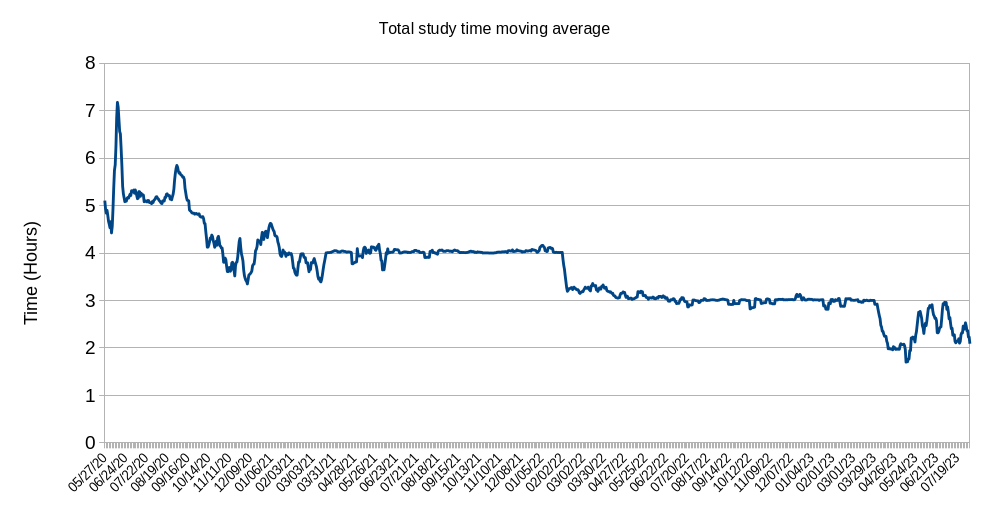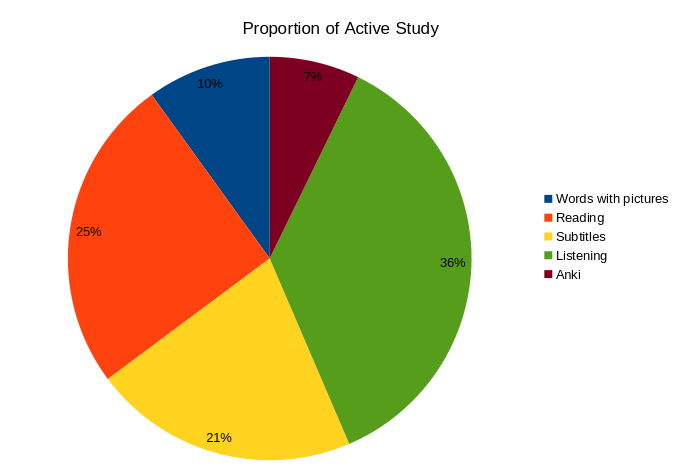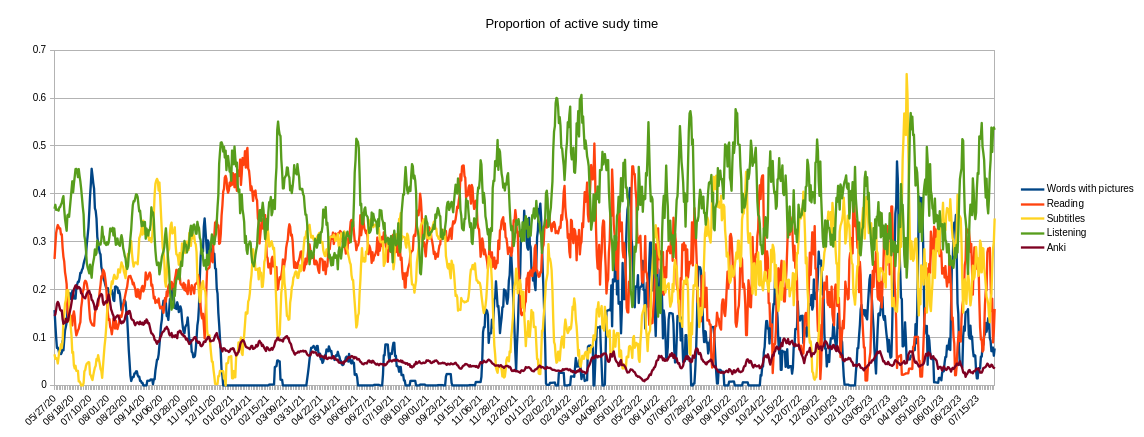I have been studying Japanese since some time in 2019. I started studying it in college because I had to take a foreign language and I was hooked on anime at the time.
Since then, I have taken it pretty seriously and collected some statistics about how I studied during this time. Around May 2020 I started feeling like I could read novels in Japanese, so I started tracking how much I read and watched. I was also taking classes from September 2019 to June 2021, which is not included in the data.
Study method
As mentioned in the above paragraph I spent two years taking classes. I also, during and after that time spent, a lot of time reading and listening to Japanese. When I came across a word I didn't know I would look it up and usually make a flash card for it. I would put said flash card into a program called Anki. At some point I started to feel that Anki was not worth it to continue, so I stopped. As a result I do not know exactly how many anki cards I had, but I recall it was over 10,000.
Early on in studying (within the first three months) I went through RTK. I created about 20 flash cards a day early on and reduced the rate later. I thought this was extraordinarily helpful.
Statistics
If you thought you could get through an article of mine without a bunch of boring statistics you were wrong! All the data can be found in timeTracker.ods.
Total study time per day

I took the moving average over a 7-day period to smooth out the data. There was a notable drop in 2022 after I graduated, and again in 2023 because I was busy for some time around then. However overall it is safe to say I studied 3-4 hours a day. Time spent learning in class is not represented in this chart.
The total time recorded was between 5/27/2020 and 8/11/2023 was 4,241.2 hours. I kept studying after that, studied before that time period, and did not record all study time in that period. Therefore, I think I can safely say study time is over 5000 hours giving me the clickbait title of this article. If I were to accurately estimate I might say it is between 7000-8000 hours.
Study time by category

Anki was reviewing flashcards in anki, Listening was listening to something without any subtitles, but possibly with visuals. Subtitles was watching something with audio and subtitles. Reading is anything where there is only text. This was mostly novels and other books. Words with pictures is anything with visuals and written words. This was mostly comics, but would also include video games. Conversation was anything where I was speaking. I only started tracking conversation near the end of the data, so it only has 3.5 hours in it in total. In reality it is much more.
I would say that listening is probably underestimated because I would sometimes watch a YouTube video casually and not make a note of it.
Study time by category over time

I also tracked the proportion of time I spend studying each category over time. The graph is a bit messy, but if you look carefully it can be informative.
It seems like reading and listening are somewhat cyclical. Probably what happened is I would get very interested in a book or a manga and read that for a while. Other than that I think there was a solid balance between reading and listening.
How good am I?
Ability end of data
Around August 2023 was probably when I was best. I went to Japan on vacation at that time. I could understand most things people said to me, and could read pretty much anything written down I encountered. I was able to talk, but it was a bit harder for me to do that. I don't think I could talk about anything complicated like statistics, or physics.
I felt confident I could pick up a book and read it. Without a dictionary I might miss some nuance some places, but with a dictionary I would have a very high level of comprehension. That being said I was slow at reading. I am not the fastest reader in English, but in Japanese I particularly slow.
I had a similar level of comprehension for subtitled videos.
Listening was a bit more hit or miss and often depended on the speaker, and content. 中田敦彦のYouTube大学 was pretty easy to understand, but more unstructured videos, like livestreams, were a bit harder.
Current ability
After August 2023 I decided to stop tracking how much Japanese I did, and just study it as much as I feel like on any given day. This resulted in a drop in total study time. I would say I maybe get a good hour or two a day, but have some days I do nothing. While I was studying I also had a job, and was studying for actuarial exams, so feeling like I have to study for a certain amount of time every day became a source of stress. So I stopped tracking it.
I still feel pretty confident in my reading ability though I don't feel like it has gotten much better. For an objective reference I recently finished reading 傷物語 which I thought was easy to read4.
I feel that I have become slightly better at listening as though. I attribute this to the fact I have been listening to audiobooks in the last year.
I think I have gotten worse at speaking, and I would need to do more practice to get better.
Advice
How to study
I think the ideal study method involves a combination of getting a lot of input, explicit grammar/vocab study, and some conversation practice. Depending on your personality the best form of each of these will be different. I like reading books on grammar so that is good for me. Anki cards are a popular form of study, but if you don't like anki I don't think there is anything special about it. With input there is also some variance. Some people will like listening to the same thing five or six times to improve understanding while other people like a lot of variety in their material.
Also, I would recommend trying to talk to someone at least once a week, and write something every day. If you aren't comfortable doing this at first, that is fine, but a little bit of output can really help in my experience. When I was in school I would speak Japanese with my classmates, but stopped after we graduated. I felt there was a notable difference in my speed of improvement.
On taking advice
I am not sure if this is unique to Japanese learners, but Japanese learners seem to be fairly innovative, and come up with a lot of different techniques for learning Japanese. However, there is some disagreement about the effectiveness of various techniques. For example, some people will swear by RTK while others will say it is a waste of time. Some people will then use the fact they got great results as evidence their chosen study method is effective. I think they often have the best intentions, and usually have legitimately gotten good at Japanese. However, I think we have a bit of a survivorship bias amongst the people who have stories on how they got good (no one ever publishes a video "I did this kind of weird study method for two years and am just kind of okay"). Some people are more naturally suited to pick things up through different methods. I would recommend trying out different study methods and see what works. Also, if any of the advice here seems bad to you, then don't do it! What works for me might not work for you.
Building on this I would do some research on the science of second language acquisition. Researchers have done a lot of work into looking into how people learn languages, and I think it is good to be informed. On the internet it often seems discussions about language learning boil down to who can make the better snarky comment while, in my experience, books written by academics will do a better job of trying to fairly explore ideas. I have reviewed 外国語学習の科学 in the past, and can confidently say that is a solid if you already know some Japanese.
Enjoying media in a language you are bad at
I think that when you start reading/listening to Japanese it can be frustrating because you understand way less than you are used to. However, I think this is mostly a problem of mindset rather than a fundamental problem. For example, if you watch Anime you could focus on the nice music and animation, and still have a good time understanding literally 0% of the dialogue1. I showed my brother a few はじめしゃちょー videos3 and he thought they were funny despite not knowing any Japanese. Hajime is pretty good at being funny just through body language, and if you don't care you are missing a few jokes his videos are still entertaining.
This requires a bit of getting used to, but I think it is good to keep in mind that you are trying to change your mindset.
JLPT
I don't think you should pay much attention to the JLPT. If you are in a situation where there is some concrete benefit to passing it, like a job requiring it or something like that, then you should probably take it, but outside of that I don't think it should affect how you study. There is the danger that a measure could become a goal with the JLPT and you start studying for the test, and not just to learn Japanese. I also don't think it is that hard to evaluate your Japanese ability just through self reflection. Also, I don't think other people with think more or less of your ability based on your JLPT score. I have never asked someone what their TOEFL score was, and I think a similar principle applies for the JLPT.
Similarly, I don't like the idea of dividing language into levels like "basic", "intermediate" and "advanced". Don't get me wrong Natsume Soseki novels are going to be harder to read than your average manga, but outside of special categories like classic literature there isn't really much variance in terms of difficulty. Once you get to media that can be enjoyed by middle schoolers pretty much all grammar and vocabulary is on the table. For example, I saw that すら was n1 grammar2. This shows up in the YuGiOh manga and most major writings. So if you are looking for something to read/watch instead of looking for something that is "on your level" I would read the first few pages/watch a little bit of whatever you are interested and see if it will be entertaining to you.
Should you take a class?
If you have the opportunity to take a organized class at a university or similar setting I would recommend doing so, but I don't think it is essential. Taking a class has a lot of obvious direct benefits: a good place to learn grammar, structure in learning, opportunities to talk, etc. However, I think the biggest benefits are indirect. If you are taking a class then there will be other people you can talk about Japanese media with and have a good community. Having a community to talk about Japanese with can really increase motivation.
For grammar, I would recommend going through Tae Kim, and then go through the "Dictionaries of Japanese Grammar", memorizing all the grammar points in the books. I think that would be sufficient for grammar
Try to create an efficient workflow for looking up words/making flashcards. If you spend 30 seconds per lookup then lookup 10,000 words you will spend 83.3 hours looking up words. But if you can shave that down to 1 second you are just under 3 hours in 10,000 lookups. I would recommend aiming for spending less than a second per flash card made and time to get a definition of a word up. Also, if it would take too much time/effort to make a flash I just skip it because it is not worth it.
RTK
Early on I went through Remembering the Kanji by James Heisig. I thought it was really helpful, and I could recognize most kanji by the end of it. However, it seems different people have different experiences with it. I think it is good enough that you should try it out, but maybe go at a relaxed pace and if you are having trouble remembering the kanji come back to it later.
Future Plans
I think I will keep studying Japanese at a relaxed pace. I like a lot of Japanese Youtubers, books, comics, etc. that are hard to find in English. I don't think I will try to learn another language in the near future.
-
I would recommend watching things where you understand more than 0% because you learn through comprehensible input, but the point here is about it being entertaining not what to use. ↩
-
In particular I showed him these two: https://youtu.be/br2XNwXXSJg https://youtu.be/26AhefM_NyM ↩
-
The language was simple, but the book was very entertaining. I recommend it a lot. ↩